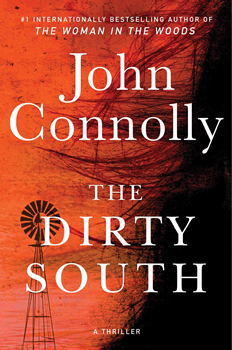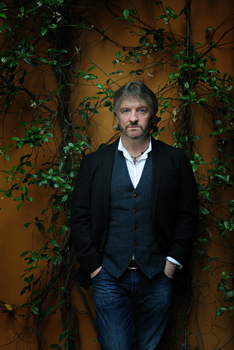

Between the Lines: John Connolly
Out of the Past
When he sat down to start THE DIRTY SOUTH, John Connolly decided to build himself a time machine. Not literally, of course. But after more than two decades of writing, during which he’s done everything from science fiction to haunting fairy tales to a fictional account of comedian Stan Laurel, Connolly is still best known for his long-running supernatural-crime series about Charlie Parker. This time, however, the veteran author wanted to try something different.
“I’m now approaching my 20th novel about Parker,” he says. “Because the narratives are so interconnected, I sometimes feel a bit like Jacob Marley, dragging the chains of past deeds around with me.”
To free himself from that weight, Connolly chose to take a character who’s now in his mid-50s and rewind the clock, exploring his life as a much younger man. “In that sense, going back to a time just before the events of my first novel, Every Dead Thing, was quite liberating,” he says. “The novel has a different energy as a consequence.”
When THE DIRTY SOUTH opens, Parker stands at the edge of the beach, reflecting on those he’s lost. But his memories soon transport him back to the rural town of Cargill, Arkansas.
The year is 1997, and Parker is a drifter who’s hauled into the local police department. Chief Evander Griffin is wary of Parker, who has suspicious-looking cuts on his right hand and a file full of information about the unsolved killings of a local Black woman, Patricia Hartley.
Frustrated by Parker, Griffin has him thrown in jail, where he spends much of the early part of the novel. Meanwhile, as another dead woman is found and tensions in Cargill escalate, Parker stews with anger and frustration. “Whether you’re a new reader or an old one,” Connolly says, “you get the sense that this man has a certain potency, and by locking him up, the local police are making a serious mistake.”
When Parker gets out of jail, he doesn’t immediately dig in on the series of local murders. In fact, he turns his back on them. “Parker doesn’t do what we might expect him to do, because he’s not the compassionate, near Christ-like figure that he has become in the later books, a man who is incapable of turning his back on the pain of others,” Connolly says. “He has no interest in helping, and little or no empathy, because he’s so caught up in his own grief and rage.”
Despite his initial reaction, it’s not much of a spoiler to reveal that Parker doesn’t walk away for long. “That was probably what interested me most about going back to a younger Parker: trying to locate the moment where he realizes his duty to others,” Connolly says.
When Parker does vow to get justice for these dead women, he works closely with Chief Griffin, who is both a mentor and a reflection of the kind of man Parker might’ve been, if only his life had turned out differently. “Throughout the series, Parker is presented with older male figures as possible role models, but also as father substitutes, since Parker lost his father during his teens,” Connolly says. “Griffin is one of those figures.”
Although Griffin is clearly flawed, Connolly notes that these flaws don’t define him. “In fact, he commits himself to making up for his past failings by refusing to collude in the cover-up of the killings at the heart of the book,” he says. “In his quiet way, he demonstrates a mode of behavior to Parker, who is much younger than him.”
Many of the characters we meet in Cargill, from a corrupt cop to a fallen preacher, are also haunted by their own histories. “It’s a difficult business, attempting to liberate oneself from one’s past,” Connolly says. “It forms us, and so much of what we do and what we become is a reaction to it. “
That’s especially true of Parker, who has lost so much. As Connolly admits, “The whole Parker series is, on one level, an examination of grief and survivor’s guilt and how one goes about not overcoming these things, but simply living with them while not allowing oneself to be poisoned by them.”
For all the ways in which THE DIRTY SOUTH is a haunting meditation on the past, make no mistake: it’s also a gripping page-turner, one which at times has the feel of a classic western. While this wasn’t a deliberate choice, Connolly does have Parker reading a Louis L’Amour memoir at one point—a book he’s also read—and acknowledges that westerns are a big part of his own entertainment diet.
“Western movies are one of my weekend pleasures,” he says. “I tend to treat myself to a viewing on a Saturday morning over toast and coffee, with the dogs sleeping on either side of me. Off the top of my head, I love Ride the High Country, The Hired Hand, anything by Sergio Leone or John Ford, and Sergio Corbucci’s The Great Silence.”
While Connolly relished the chance to put a young Parker back in action and let long-time readers deepen their understanding of the character, he also saw an opportunity here. “One of the risks of writing a series is that there comes a point where the sheer weight of novels may discourage new readers from coming on board,” he says. “It’s kind of polite, I suppose, to give them a more recent starting point every so often. It’s the equivalent of pausing a group chat at a party to welcome a newcomer and find common ground with them.”
As for what’s coming up next, Connolly has a book called The Nameless Ones, which will explore series regulars Angel and Louis, with Parker playing a small role. But there is also much more Parker to come. “During lockdown, I published a Parker novella, The Sisters Strange, in short daily extracts,” he says, “and I want to go back and revise that with a view to publishing it down the line, perhaps with a second novella.”
Meantime, Connolly is in the early stages of a new Parker novel. “I wish I could tell you what it’s about, but I haven’t quite figured that out yet, although it draws, in its odd way, on a Shakespeare play,” he says.
While that may sound ambitious, Connolly finds that he’s always reaching. “I see no reason why mystery fiction shouldn’t be as well-written as literary fiction,” he says. “In he, the novel I wrote about Stan Laurel, Stan asserts that ‘every creative endeavor should aspire to the condition of art.’ I share that belief. I may fail, but even by trying to achieve it, my work will improve.”
- LAST GIRL MISSING with K.L. Murphy - July 25, 2024
- CHILD OF DUST with Yigal Zur - July 25, 2024
- THE RAVENWOOD CONSPIRACY with Michael Siverling - July 19, 2024



